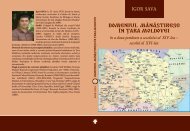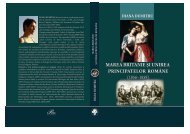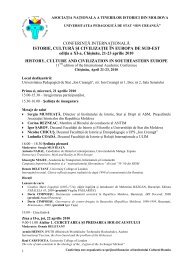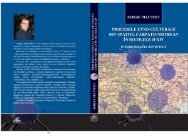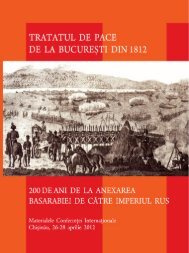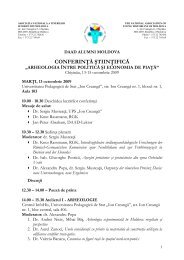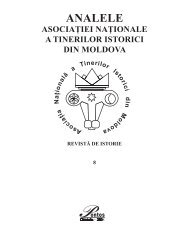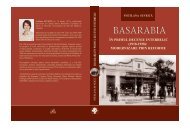LUCIA SAVA, Viaţa cotidiană în oraşul Chişinău la - Asociatia ...
LUCIA SAVA, Viaţa cotidiană în oraşul Chişinău la - Asociatia ...
LUCIA SAVA, Viaţa cotidiană în oraşul Chişinău la - Asociatia ...
You also want an ePaper? Increase the reach of your titles
YUMPU automatically turns print PDFs into web optimized ePapers that Google loves.
<strong>Viaţa</strong> <strong>cotidiană</strong> <strong>în</strong> <strong>oraşul</strong> <strong>Chişinău</strong> <strong>la</strong> <strong>în</strong>ceputul secoului al XX-lea (1900-1918)<br />
211<br />
the concepts from other disciplines such as the social psychology and the<br />
human geography. „The history, argued Lamprecht, is primarily a sociopsychological<br />
science”.<br />
His conception of the history was continued by another German scientist,<br />
Otto Hintze, follower of Max Weber, one of the few historians who have<br />
treated the kind of history as required by Lamprecht, evolving beyond Ranke.<br />
Obviously, that Lamprecht’s attempts to break the monopoly of the political<br />
history failed in Germany, but they had significant echoes in the United<br />
States and France. Around 1890, the American historian Frederick Jackson<br />
Turner <strong>la</strong>unched attacks against the traditional history in the same manner:<br />
„It must be taken into the consideration all the spheres of the human activity<br />
... No sector of the social life can be understood in iso<strong>la</strong>tion.”<br />
His contemporary, James Harvey Robinson, called also for the new history,<br />
a history of dealing with all human activities and to take the ideas from the<br />
anthropology, the economics, the psychology and the sociology.<br />
In France, 20th years of <strong>la</strong>st century represented a new kind of the historical<br />
period, movement started by two professors at the University of Strasbourg<br />
Marc Bloch and Lucien Febvre. Review initiated by them, Annales<br />
d’histoire économique et sociale, criticized the traditional historians. Like their<br />
Germans and Americans predecessors, the two French historians opposed to<br />
the prevalence of political history, which wanted to rep<strong>la</strong>ce with „a broader<br />
and more human history”, a history that includes all human activities and be<br />
less concerned about the story events further „structural analysis”, commonly<br />
used within the School of Annales’s historians.<br />
As Febvre and Bloch, historians wanted to use their information in the<br />
work of neighboring disciplines: geography, sociology, psychology, anthropology,<br />
etc.., Encouraging the interdisciplinary cooperation and making this<br />
history a position of hegemony among the social sciences.<br />
Trying to define the new directions of the historical research, L. Febvre<br />
argues that each civilization, each level of culture and social categories correspond<br />
to each his own mental equipment, which includes in its structure<br />
both, the educational concepts and the behavior. defined as a „life style”. M.<br />
Bloch’s conception of history is the objective of human being, which must be<br />
studied both as individuals and as a social factor.<br />
Therefore, The Annals School, gathered around the magazine founded by<br />
Marc Bloch, opposes the traditional historiography, which study too deep<br />
the well known events: it was history-treated-and-battles, but was still clearing<br />
a huge expanse of non-occurrence, which limits are difficult to be seen: the<br />
regional history, the mentalities, the safety of insanity or search over time.



